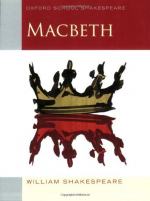|
This section contains 6,923 words (approx. 24 pages at 300 words per page) |

|
SOURCE: “Macbeth: History, Ideology and Intellectuals,” in Critical Quarterly, Vol. 28, Nos. 1-2, Spring-Summer, 1986, pp. 63-77.
In the following essay, Sinfield contends that Macbeth is a political play that centers on the distinction between violence that the state considers legitimate and violence that it considers evil.
It is often said that Macbeth is about ‘evil’, but we might draw a more careful distinction: between the violence which the State considers legitimate and that which it does not. Macbeth, we may agree, is a dreadful murderer when he kills Duncan. But when he kills Macdonwald—‘a rebel’ (I.ii.10)—he has Duncan's approval:
For brave Macbeth (well he deserves that name), Disdaining Fortune, with his brandish’d steel, Which smok’d with bloody execution, Like Valour's minion, carv’d out his passage, Till he fac’d the slave; which ne’er shook hands, nor bade farewell to him, Till he...
|
This section contains 6,923 words (approx. 24 pages at 300 words per page) |

|


